Since this is an inquiry of general interest, I thought I'd post my musings on this topic here, where they can last forever to the enlightenment of future ages. Or at least the two or three people who might happen to stumble upon them while desperately googling "graphic".
Let me know which comics or graphic novels I should check out. I've only read the obvious(Watchmen, Dark Night, Sin City). I occasionally stumble into a comic book store, but get sort of overwhelmed with my ignorance and run out empty handed... I'd love to hear what you recommend.
By far the most important thing to say in this context, I think, is that there no longer is a general answer to this question: and that that is a good thing. You see, two decades ago, there were a few obvious answers -- because there simply wasn't a lot more that was both good and readily available. The medium was still arising out of its ancestors (comic books both mainstream and underground; comic strips; manga and bande dessiné; and other influences) and while one could point to older stuff, it wasn't generally graphic novels as such (by which I mean longer comics of serious intent), was usually hard to find, and wasn't very accessible, or simply not very good. So you pointed to the obvious stuff.
That isn't true any more. Thanks to the explosion of graphic novels -- new, reprinted and translated from other countries where these things have always been taken more seriously -- there now is simply a lot out there. At this point, asking 'what graphic novels should I read?' has become a question equivalent to 'what movies should I watch?'. There is no general answer to the latter question, not only because there is simply too much good stuff out there, but also because it depends on your taste. Where do you start with movies? 8 ½, Citizen Kane or Casablanca? Or with the latest blockbusters, the latest Oscar winners, the latest art films? Depends who you are and what you want.
So that's the most important thing to bear in mind. Graphic novels are a medium, and as such, there's stuff to anyone's taste -- and good stuff that is not to your taste, whoever you are. And, therefore, anyone can be at best only an imperfect guide for you.
Now, everything I've said before is true -- indeed, increasingly true. But it's only recently true, which means that there are still, to a greater extent, 'classics' that everyone should read -- simply because of the youth of the medium. So there are three books I'd recommend unreservedly to anybody. My cousin mentioned one above, Watchmen, which is not only one of the greatest graphic novels written, but is -- I'd say inarguably, save that so many people have tried to argue it -- the single greatest superhero story ever written, and a work which can be enjoyed even by those with no particular interest in or taste for the odder aspects of the superhero genre. So that's a good place to start. I'm assuming that we're all beyond the gosh-gee-graphic-novels-don't-have-to- be-about-superheroes-any-more stage, but since that association is still strong, we may as well point to Watchmen -- particularly since it is good enough for anyone to like.
Two other classics of the same stature should be mentioned here. The first, Maus (which is published both in two volumes, as Maus I and Maus II, and in a volume entitled The Complete Maus) came out (or at least the first half of it did) around the same time that Watchmen and The Dark Knight Returns did, and were one of the first wave of graphic novels to get and deserve wide and serious attention. And, like Watchmen, Maus is one of those works which deserves it. Because it too is so good that even if you have no particular interest in its subject area, you should read it and will like it. It is -- as I assume most people know -- a holocaust memoir, the story of the father of its creator, Art Spiegelman, and tells both the story itself and of the relationship of Art with his father. There can be a tendency to over-praise works on the Holocaust because of the importance of the subject rather than the quality of the work itself -- but this is very much not the case with Maus. It's an amazing book and everyone should read it.
The other classic to mention is Scott McCloud's book Understanding Comics. It's a book of, essentially, art theory, talking about how comics works (which will tell you, among many, many other things, why the phrase preceding this parenthesis is, in fact, grammatically correct.) Art theory, but also itself comics -- sequential art with both words and pictures (to combine the two most famous definitions of comics.) And I always hate to describe it this way, because it sounds academic and dry and dull, but good lord is it anything but -- it's absolutely captivating and witty and engrossing and really wonderful, and, like Watchmen and Maus, I recommend it unequivocally to everyone, whether or not you have an interest in its subject matter -- which just happens, in this case, to be comics itself.
Okay, those three are foundational -- and, among other things, a very good sample of the diversity of the graphic novel medium: a superhero story, a realistic historical memoir, and a non-narrative nonfiction work. But where do we go from here? (The battle's done, and we've kind of won... sorry, wrong topic.)
Well, here all the stuff I said above about how it depends on your taste comes into play. Because there is such a diversity of material. So from here on, I'll try to describe things by genre or feel or type, and point you towards a few good things in each category.
Realistic fiction. The gold standard here is probably Chris Ware's Jimmy Corrigan. It's an extraordinary work, complex and rich and wonderful. The problem is that it's also an extraordinarily bleak, depressing book: Chris Ware makes Beckett look like a cheerful guy given to action tales. So while it's really, really good, it will not be to everyone's liking.
Fortunately there's a lot of other great stuff too. One of my personal favorites is Howard Cruse's autobiographical novel Stuck Rubber Baby, which I actually taught in my historical fiction seminar at Cornell this past year (twice, once each semester). It's the story of a white, gay man growing up in a southern city (a fictionalized Birmingham, Alabama) at the height of the Civil Rights Movement (and, therefore, before the Gay Rights Movement began in any but the most rudimentary fashion). It's absolutely terrific, although Cruse's drawing style take some getting used to.
Other stuff. If you like comedy, read Kyle Baker's Why I Hate Saturn. Will Eisner did a wonderful novel about life on the lower-east side back in the 1930's known as A Life Force. Craig Thompson's Blankets is a coming-of-age graphic novel. Alan Moore did a long historical novel about Jack the Ripper which is wonderful and sophisticated and every bit as violent and sex-filled as you'd expect a novel about a prostitute-killing serial killer to be (fair warning), called From Hell. There's a postmodern mystery novel (okay, I'm pushing the boundaries of "realistic fiction" here, but it's good) adapted from a prose novel by Paul Auster (and which I actually think is (gasp!) better than the novel, although the latter is quite good), called Paul Auster's City of Glass, by David Mazzuchelli. There's a early twenties, down-and-out-and-don't-know-what-to-do book by Alex Robinson called Box Office Poison that I liked a lot. Neil Gaiman, better known for his fantasy comics (see below), did some great more-or-less-realistic graphic novels with artist Dave McKean, Mr. Punch and Signal to Noise. I haven't read as much Love and Rockets as I should have (I'm working on it!) but most people who have read it think it's among the best there is; the two big collections are Locas by Jamie Hernandez and Palomar by Gilbert Hernandez.
Memoir and autobiography. Here I'm tempted to recommend Alison Bechdel's Fun Home on the strength of her ongoing comic strip Dykes to Watch Out For (for more, see here), but since I haven't read it yet, I suppose that would be irresponsible of me. (My copy's on order; ask me again in a week.)
Okay, other stuff which I've actually, y'know, read. Marjane Satrapi's memoir of growing up in Iran, Persepolis, is wonderful. Samuel R. Delany (best known as an SF writer) did a marvelous, very brief memoir of how he met his (still-current, I believe) lover, Dennis -- who was homeless at the time -- called Bread and Wine. Katherine Arnoldi's The Amazing True Story of a Teenaged Single Mom has very simple art, but is a great story. Harvey Pekar has done very brief, slice-of-life pieces for many years in a comic known as American Splendor. Start either with the collection of works he did with cartoonist Robert Crumb, American Splendor Presents Bob & Harv's Comics, or his book-length work about the year he had cancer (co-written with his wife, Joyce Brabner), called Our Cancer Year. And there's a book by Chester Brown about his teenaged obsession with pornography called The Playboy which is quite good too.
Science-fiction and fantasy. Here the place to start -- one that is almost as central as the works that my cousin mentioned -- is with Neil Gaiman's Sandman. The problem with Sandman, though, is that the first volume is distinctly inferior to the others (ten in the main series, plus four auxiliary volumes by Gaiman and various spin-offs by others). And while it's easy to say, yeah, yeah, I'm interested enough to get through that, you may end up doing what I did and reading the first and thinking 'ehh' and putting it down (in my case, for at least a year). So I recommend starting with volume two, The Doll's House. All you really need to know to do so is this: that there are seven beings, older than the gods and not worshiped by humans, named Destiny, Death, Dream, Desire, Despair and Delirium (and one other whose name is revealed later); and that Dream, the hero of the series, was recently held captive for seventy years, and has just returned to begin repairing his domain, the realm of dreams.
Grant Morrison has also written a bunch of wild SF; here I'd recommend starting with The Filth, since it's one volume and will be a good indication of whether you like his particular brand of lunacy. If so, you can go on to The Invisibles (seven volumes, the first is Say You Want a Revolution). Further good SF/Fantasy includes Brian K. Vaughn's thriller Y: the Last Man (seven volumes and still ongoing; the first is Unmanned). Alan Moore's Swamp Thing is a mix of horror and fantasy and some superhero elements, and is terrific; the first of six volumes is Saga of the Swamp Thing.
Superhero comics. My cousin mentioned The Dark Knight Returns, which is good, but which I wouldn't recommend to anyone without some prior interest in superhero comics and a bit of knowledge of Batman in particular. But if you are interested in this sort of thing, there's lots of good, recent stuff.
The first place to start is probably with Alan Moore's other superhero work, particularly the comics he published in his own line, America's Best Comics (and no other writer could get away with doing, under that name, an entire line of comics by one person. But Moore can, and did.) The League of Extraordinary Gentlemen (2 volumes, plus one forthcoming) is probably the most broadly popular; it's a series which explores the roots of the superhero genre in nineteenth century pulp fiction, teaming up Mr. Hyde, the Invisible Man, Captain Nemo and others. Then there's Promethea (5 volumes), which is my favorite: it starts off as a fairly standard superhero story but quickly turns into a lesson in Moore's own strange occult metaphysics.; Tom Strong (6 volumes, first is the best) is a deliberately retro exploration of the nature of superheroes; and Top Ten (2 volumes plus 2 auxiliary tales) is a police procedural set in a city in which everyone is a superhero.
Also noteworthy in the superhero category are many of the works of Grant Morrison -- start with Animal Man (three volumes, I've only read the last) and Doom Patrol (three volumes, more being reprinted), although he also did a run on X-Men if the movie has inspired you (more below). Further good stuff includes Kurt Busiek's Astro City (five volumes, still ongoing); Warren Ellis's Planetary (four volumes, one forthcoming) and -- less serious but lots of fun -- Warren Ellis's Authority (two volumes); and Brian Michael Bendis's Powers (I've only read the first few, but it's fun; a lot of his other stuff looks less interesting, though). There's a lot more where those came from, too, because while graphic novels have grown way beyond being just superheroes, it's still the dominant genre -- and while it probably passes the canonical Sturgeon's Law minimum of 90% crud (Sturgeon's law: "90% of SF is crud, but 90% of everything is crud"), there's still a lot of enjoyable stuff.
(Actually, my cousin mentioned comics he enjoyed as a kid -- Spiderman, Daredevil and X-Men -- so let me make some recommendations about those. First, as should be obvious, I don't think that those are the best stuff out there, even within the superhero genre. But I did enjoy Grant Morrison's run on X-Men, called New-X-Men and now collected in seven volumes (the first is called E for Extinction); it was followed by the almost-as-good run by Joss Whedon (of Buffy the Vampire Slayer fame), re-titled Astonishing X-Men, which is two volumes to date and is still ongoing; if you want to read X-Men, those are the places to start. Those also should be very accessible to those who enjoyed the movies and haven't read any other X-Men comics. Also good are the various volumes of Ultimate X-Men -- the first six by Mark Miller, the next two by Brian Michael Bendis, and then a bunch by Brian K. Vaughn. The classic Daredevil, of course, is by Frank Miller -- the best volume is probably Born Again -- I haven't read more recent stuff, although a lot of people like Brian Michael Bendis's recently-concluded run. Spiderman isn't as good, at least I don't think so, but if you want to read it the best thing to seek out is probably Brian Michael Bendis (yeah, the guy writes everything), Ultimate Spiderman.)
For kids. Wait, do kids still read comics? Do kids still read? Never mind. The following stuff is good for adults, too. (Phew!) The best that I know of, bar none, is Jeff Smith's Bone. This was originally nine volumes, was briefly available as the one-volume Complete Bone, and is now being reprinted as nine volumes again, this time in color (it was originally black and white); the first volume is Out From Boneville. Bone is a fantasy story -- think Lord of the Rings with a lot more comedy and humor. It's wonderful. If kids want to read about superheroes, a good teenage series is Brian Vaughn's Runaways, five volumes to date, the first is Pride and Joy.
Summing up. This post may have made you feel like my cousin: overwhelmed by choices. So let me sum up what I've said. Everyone should read:
Art Spiegelman's Maus
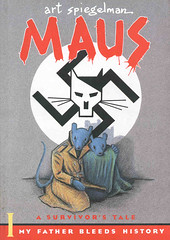
Alan Moore's Watchmen
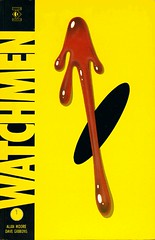
Scott McCloud's Understanding Comics.
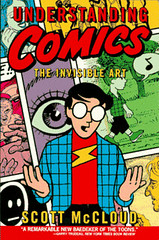
Then, by genre, I'd recommend:
Mainstream Fiction: Howard Cruse, Stuck Rubber Baby
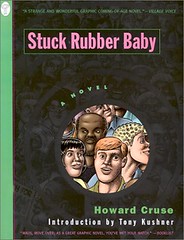
Memoir/Autobiography: Marjane Satrapi's Persepolis
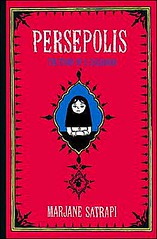
Fantasy & SF: Neil Gaiman, Sandman -- start with volume two, The Doll's House
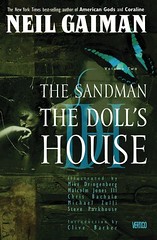
Superheroes: Alan Moore, The League of Extraordinary Gentlemen
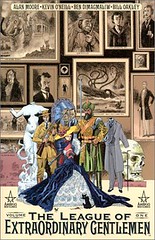
For Kids & Those Who Were Once Kids: Jeff Smith, Bone: Out From Boneville
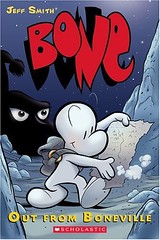
-- and I'll leave it at that lest I overwhelm you again. But remember that just because you don't like one, it doesn't mean you won't like others: it's becoming a whole world, and there's stuff for every taste.
In fact, what's really sort of amazing, I think, is that I haven't even begun to scratch the surface here -- there's more great stuff in every category, along with lots of categories I haven't even mentioned. Some people are going to say that I've omitted the very best work -- and they might be right (there's a lot I haven't read; in many ways the biggest entry barrier to graphic novels is money, since they cost a lot and read comparatively quickly (although the best can be reread many times with increasing pleasure, as Gene Wolfe said of great literature) -- but that's another post.) I haven't gotten into much non-fiction, or mysteries or any of the many other genres that are out there. There's a whole universe of stuff translated from the Japanese (where comics, known as Manga, have long been far more popular and respectable then they are here) about which I know very little, not to mention stuff from the French (where similarly comics are more respectable, known as bande dessiné) and other languages. There are collections of daily comics strips, which aren't quite graphic novels but can be wonderful. And on and on and on.
Other people's viewpoints. So seek out other people's views, too. For review sites, you could start here or here or here or here or here. Or, for best-of lists, you could start here or here or here or here or here. I don't fully agree with any of those viewpoints, of course -- that's the point! There are a lot of good review sites out there, with different views than mine.
Enjoy!
7 comments:
I started reading Alan Moore with V for Vendetta, and found it the most accessible for someone who never read superhero comics and was only faintly aware of the traditions of the genre. V and Watchmen both made me wonder whether Moore's got a thing for the superhero who gets too caught up in his own powers -- I forgave the movie version for romanticizing the relationship between V and Evie because it kept in the part where he tortures her, which is the crux of his character. He is sufficiently certain that what he is doing is necessary that he would inflict that her. But the two volumes of Swamp Thing I've read seem to contradict that simplistic take on Moore. Perhaps because Swamp Thing seems to be sort of a wonderful environmentally friendly non-human, and thus he is less subject to the temptation of acting like God.
Thank you! This was exactly the kind of answer I was hoping to find to my Google search, which was "best graphic novels to start"
Love this, thanks for the recommendations. Gotta point out though, it's Out FROM Boneville. Not of.
Of/from: oops. Now fixed. Thanks for the correction.
Thanks for the recommendation. The only one that I know. it is Watchmen.hr23 Because I watched that movie and the movie is impressive but I didn't know that it was based on the graphic novel.
Thank you so much! A greatly useful post.
What ever happened to reading a book and using your imagination to picture the people, scenes, etc.? Now we have to have people draw what we should see. What a lazy concept.
Post a Comment